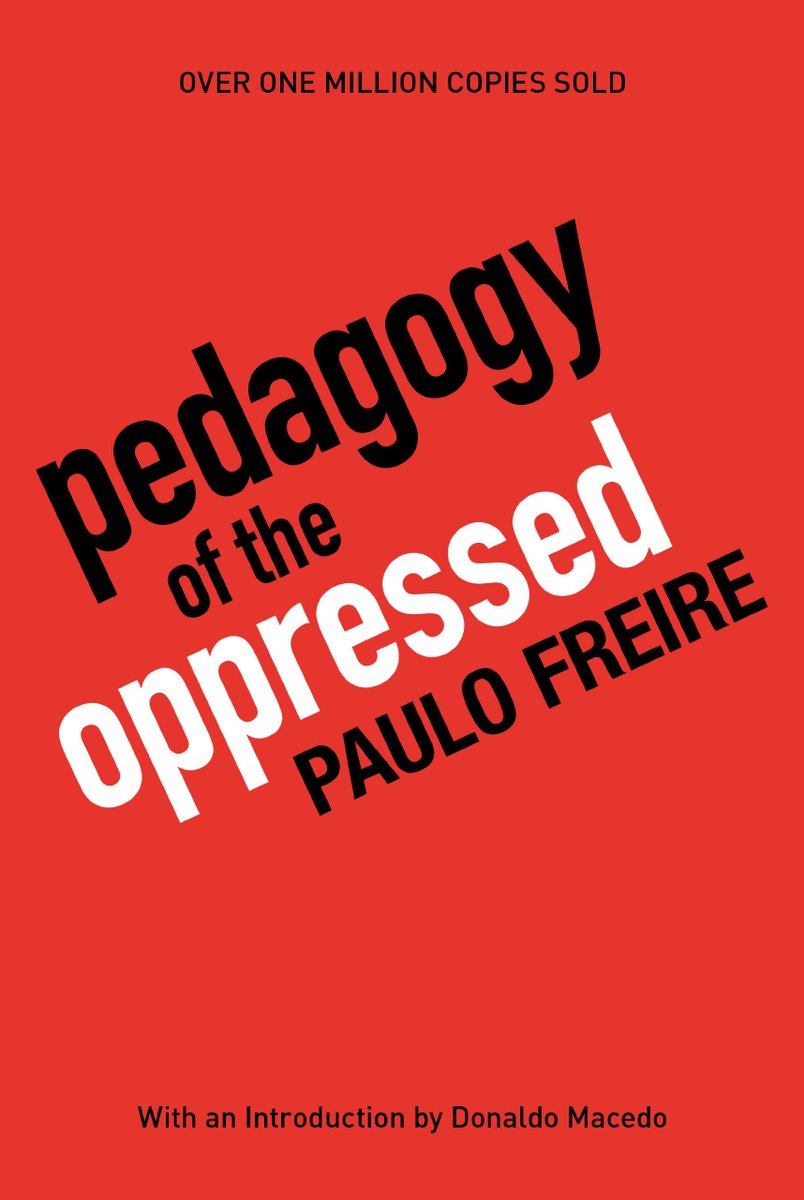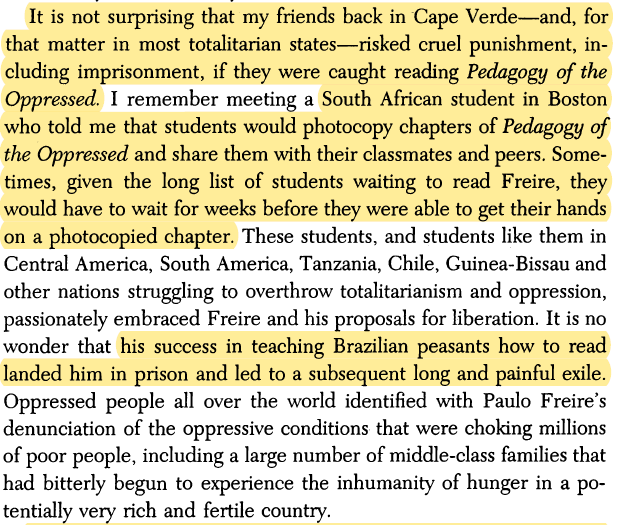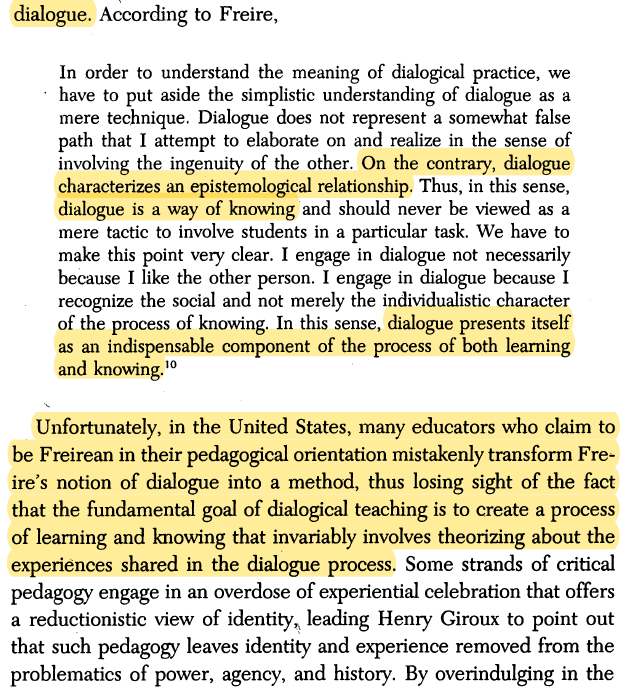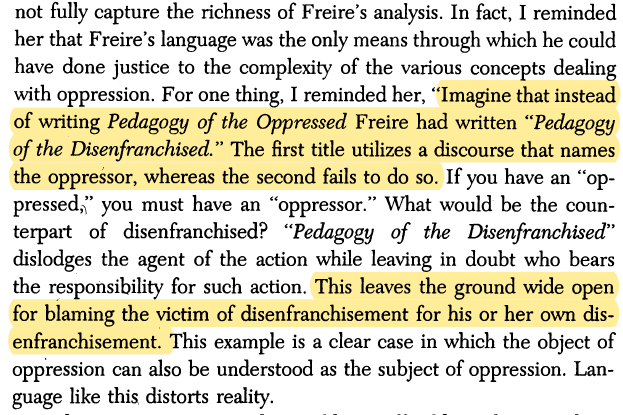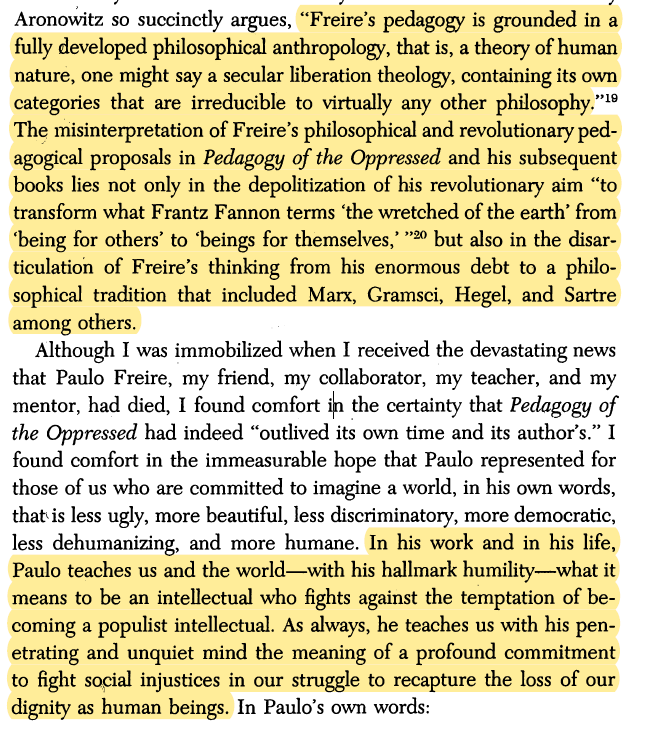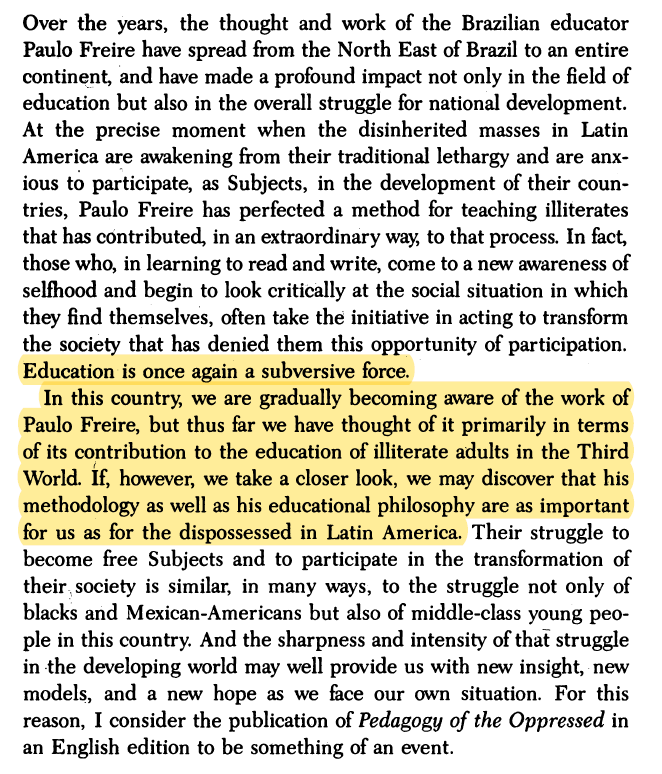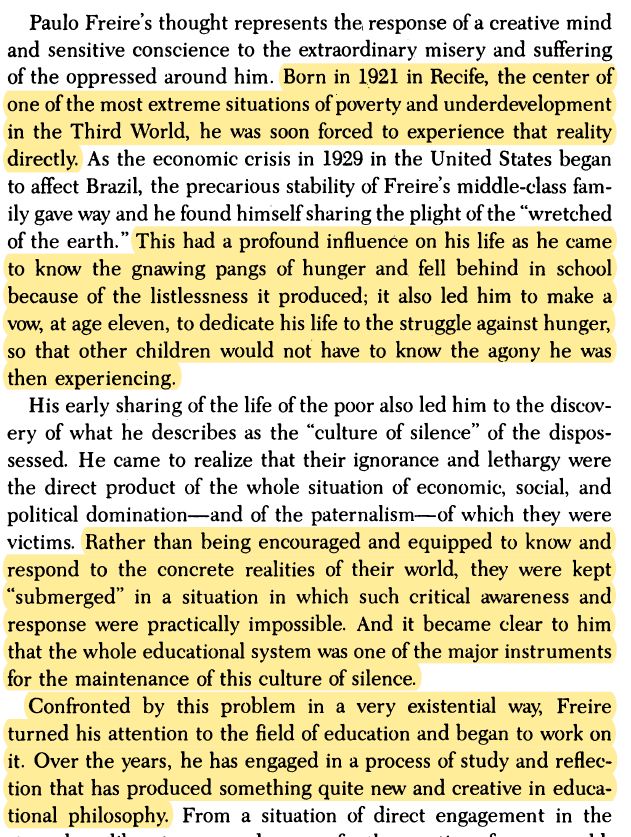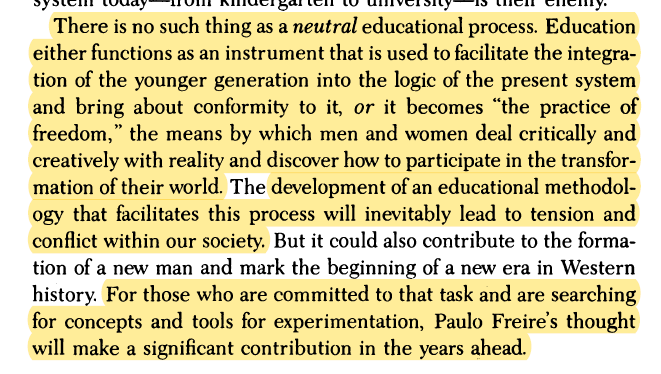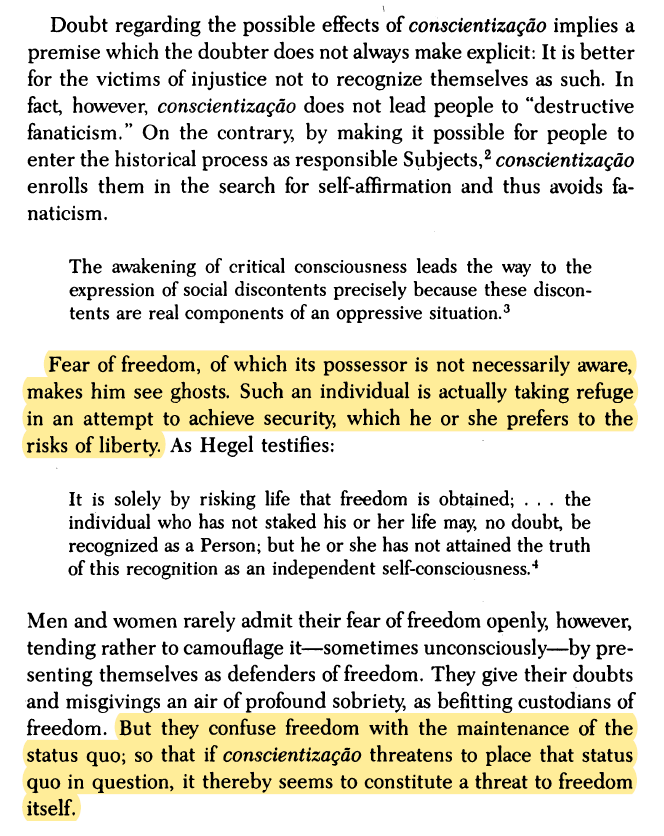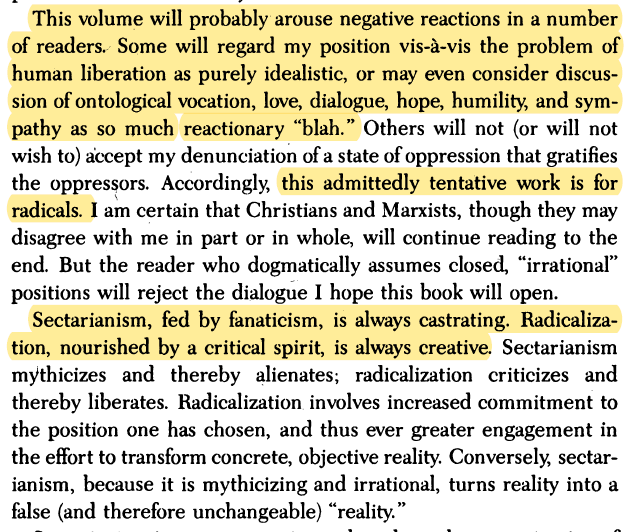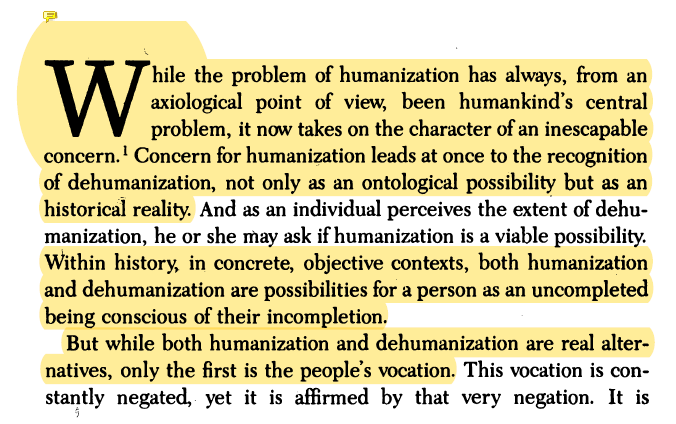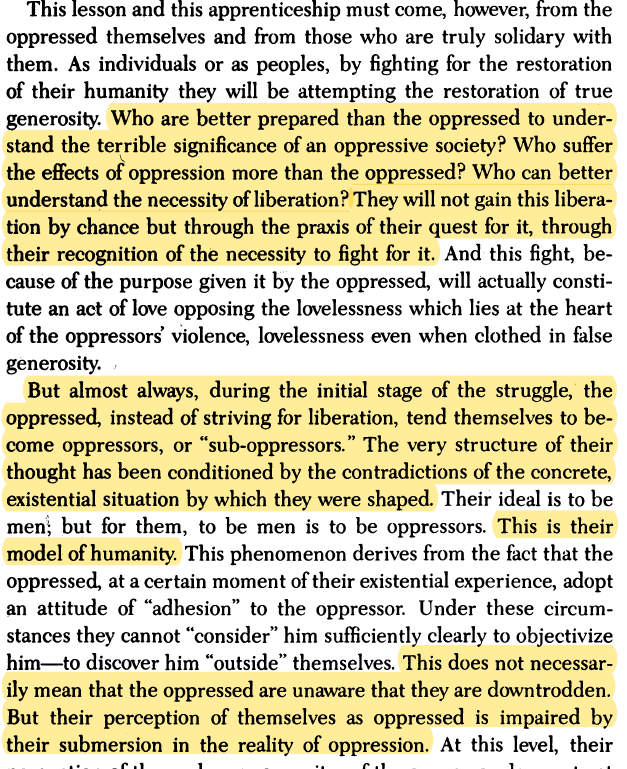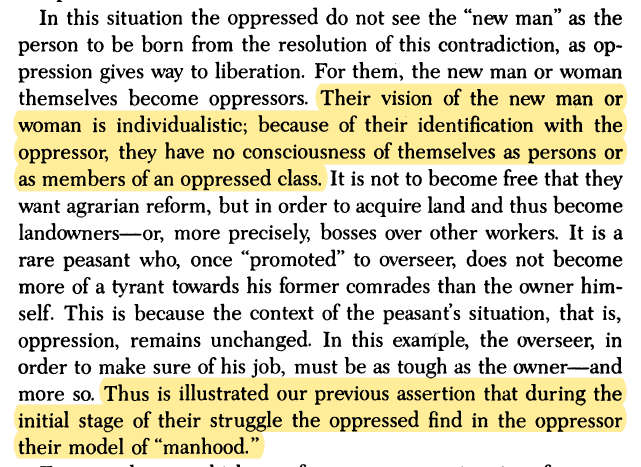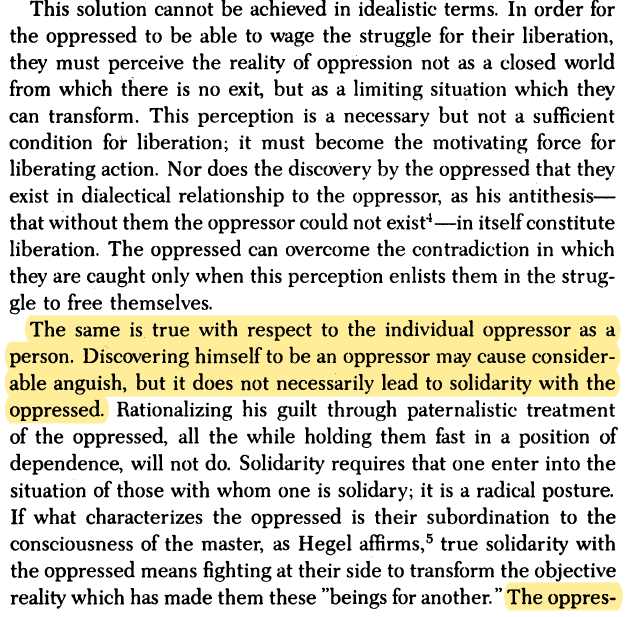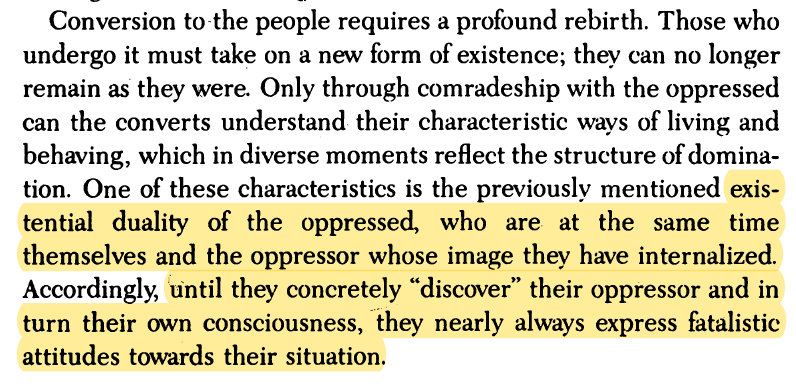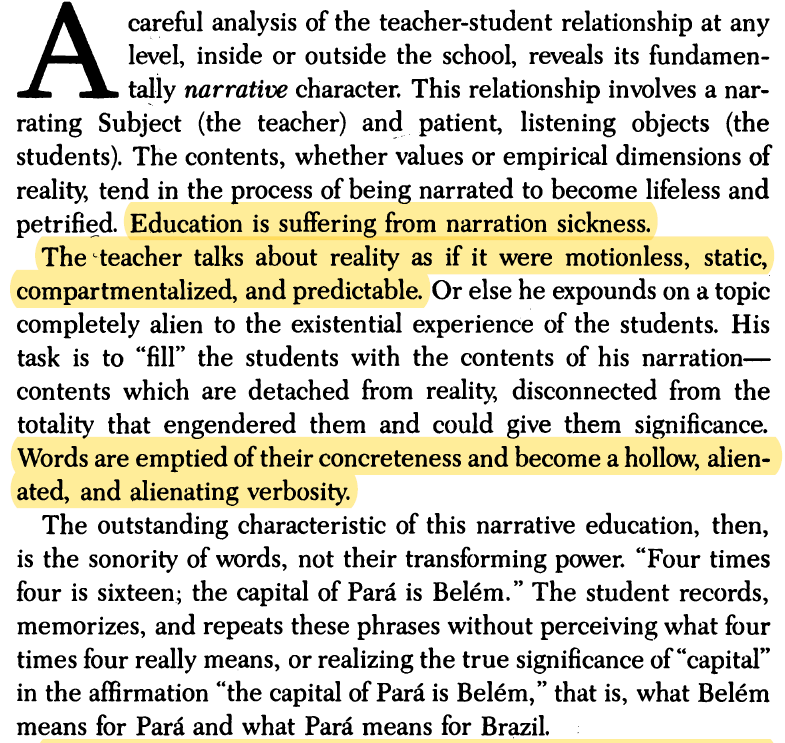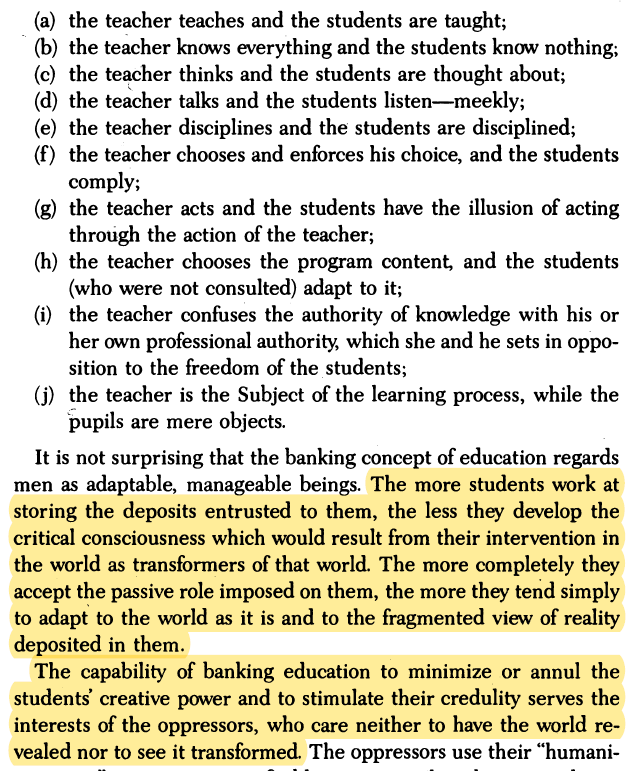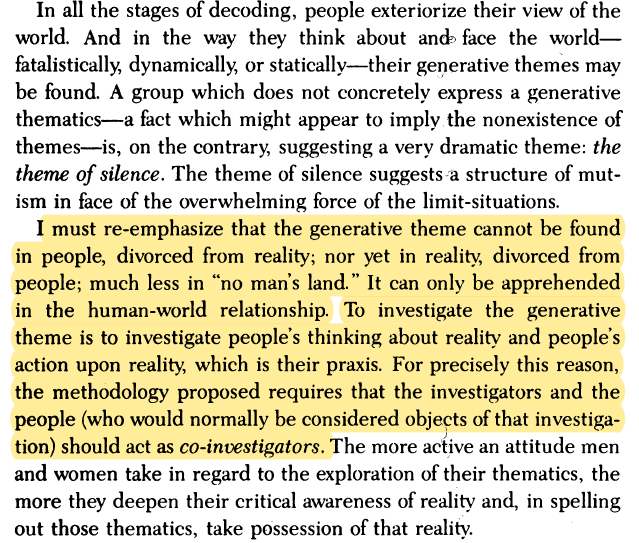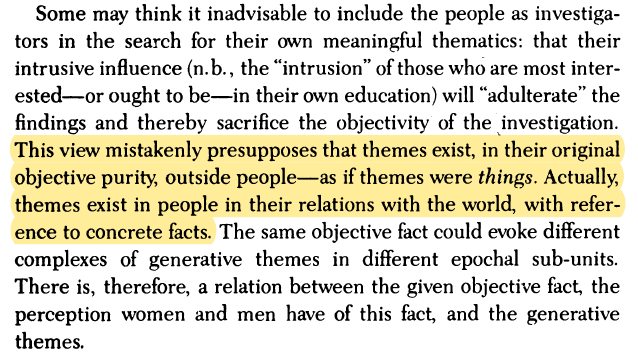Introduction by Donaldo Macedo
(Some context: the book was first written in Portuguese in 1968 and translated and published in English in 1970 and this introduction was written by Macedo in 2000 for the book’s 30th anniversary edition)
#Freire
(Some context: the book was first written in Portuguese in 1968 and translated and published in English in 1970 and this introduction was written by Macedo in 2000 for the book’s 30th anniversary edition)
#Freire
Pedagogy of the Oppressed... "meets the single criterion of a & #39;classic& #39; " in that "it has outlived its own time and its authors." #Freire
Reading Pedagogy of the Oppressed gave me the critical tools to reflect on, and understand, the process through which we come to know what it means to be at the periphery of the intimate yet fragile relationship between the colonizer and the colonized. #Freire
South African student in Boston would photocopy chapters of the book & share them with their classmates & peers. Sometimes, given the long list of students waiting to read Freire, they would have to wait for weeks before they were able to get their hands on a photocopied chapter.
Freire& #39;s denunciation of oppression wasn& #39;t merely the intellectual exercise that we often find among many facile liberals & pseudo-critical educators. His intellectual brilliance & courage in denouncing the structures of oppression were rooted in a very real & material experience
Although some strands of postmodernism would dismiss Freire& #39;s detailed class analysis in Pedagogy of the Oppressed, it is an enormous mistake, if not academic dishonesty, to pretend that we now live in a classless world. #Freire
Freire never accepted the poststructuralism tendency to translate diverse forms of class, race, & gender based oppression to the discursive space of subject positions. He appreciated the theoretical complexity of multifactor analyses while never underestimating the role of class.
"One cannot reduce the analysis of racism to social class, one cannot understand racism fully without a class analysis, for to do one at the expense of the other is to fall prey into a sectarianist position, which is as despicable as the racism that we need to reject.” #Freire
<- what is important is to approach the analysis of oppression through a convergent theoretical framework where the object of oppression is cut across by such factors as race, class, gender, culture, language, and ethnicity. #Freire
Although Freire was readily embraced in societies struggling against colonialism and other forms of totalitarianism, his acceptance in the so-called open and democratic societies, such as the United States and the nations of Western Europe, has been more problematic.
<- Even though he has an international reputation and following, his work is, sadly, not central to the curricula of most schools of education whose major responsibility is to prepare the next generation of teachers. #Freire
For eg, Harvard Graduate School of Education sanctions a graduate course called "Literacy Politics and Policies" without requiring students to read, critique & analyze work of Freire. This is tantamount to getting a doctoral degree in Linguistics without ever reading Noam Chomsky
Whereas students in the Third World and other nations struggling with totalitarian regimes would risk their freedom, if not their lives, to read Paulo Freire, in our so-called open societies his work suffers from a more sophisticated form of censorship: omission.
Part of the problem with mechanization of Freire& #39;s leading philosophical & political ideas is that many psudocritical educators, in the name of liberation pedagogy, often sloganize #Freire by straitjacketing his revolutionary politics to an empty cliche of the dialogical method.
Pseudo-Freirean educators not only strip him of the essence of his radical pedagogical proposals that go beyond the classroom bound aries and effect significant changes in the society as well: these educators also fail to understand the epistemological relationship of dialogue.
Dialogue must require an ever-present curiosity about the object of knowledge. Thus, dialogue is never an end in itself but a means to develop a better comprehension about the
object of knowledge. #Freire
object of knowledge. #Freire
Imagine that instead of writing Pedagogy of the Oppressed #Freire had written Pedagogy of the Disenfranchised. The 1st names the oppressor, & 2nd fails to do so. This leaves the ground wide open for blaming the victim of disenfranchisement for his or her own disenfranchisement.
"Professor Giroux, all my life I felt the things you talked about. I just didn& #39;t have a language to express what I have felt. Today I have come to realize that I do have a language. Thank you." #Freire
"Freire& #39;s pedagogy is grounded in a fully developed philosophical anthropology, that is, a theory of human nature, one might say a secular liberation theology, containing its own categories that are irreducible to virtually any other philosophy” #Freire
End of Introduction by Donaldo Macedo to Pedagogy of the Oppressed by #Freire
Next, Foreword by Richard Shaull #Freire
...we may discover that #Freire& #39;s methodology as well as his educational philosophy are as important for us as for the dispossessed in Latin America. #Shaull
Paulo #Freire& #39;s thought represents the, response of a creative mind and sensitive conscience to the extraordinary misery and suffering of the oppressed around him. #Shaull
The methodology he developed was widely used by Catholics and others in literacy campaigns throughout the North East of Brazil, and was considered such a threat to the old order that #Freire was jailed immediately after the military coup in 1964.
Fed up as I am w abstractness & sterility of so much intellectual work in academia today, I am excited by a process of reflection which is set in a historical context, carried on in the midst of struggle to create new social order & thus represents a new unity of theory & praxis.
Every human being, no matter how "ignorant" or submerged in the "culture of silence" he or she may be, is capable of looking critically at the world in a dialogical encounter with others. ->
Provided with the proper tools for such encounter, the individual can gradually perceive personal and social reality as well as the contradictions in it, become conscious of his or her own perception of that reality, and deal critically with it. ->
<- In this process, the old, paternalistic teacher-student relationship is overcome. A peasant can facilitate this process for a neighbor more effectively than a "teacher" brought in from outside. "People educate each other through the mediation of the world." #Freire
But they confuse freedom with the maintenance of the status quo; so that if conscientizagdo threatens to place that status quo in question, it thereby seems to constitute a threat to freedom Itself. #Freire
Thought and study alone did not produce Pedagogy of the Oppressed; it is rooted in concrete situations & describes the reactions of laborers (peasant or urban) and of middle-class persons whom I have observed directly or indirectly during the course of my educative work. #Freire
Sectarianism, fed by fanaticism, is always castrating. Radicalization, nourished by a critical spirit, is always creative. #Freire
I will be satisfied if among the readers of this work there are those sufficiently critical to correct mistakes and misunderstandings, to deepen affirmations and to point out aspects I have not perceived. #Freire
From these pages I hope at least the following will endure: my trust in the people, and my faith in men and women, and in the creation of a world in which it will be easier to love. #Freire
Let& #39;s read Chapter 1 #Freire. Will do only half of it today tho, not because it is a long chapter, but because there is so much to digest and also I because I found it difficult not to tweet every line. :)
While both humanization and dehumanization are real alternatives, only the first is the people& #39;s vocation. This vocation is constantly negated, yet it is affirmed by that very negation. #Freire
[The vocation humanization] is thwarted by injustice, exploitation, oppression, and the violence of the oppressors; it is affirmed by the yearning of the oppressed for freedom and justice, and by their struggle to recover their lost humanity. #Freire
Dehumanization, which marks not only those whose humanity has been stolen, but also (though in a different way) those who have stolen it, is a distortion of the vocation of becoming more fully human. #Freire
Because it is a distortion of being more fully human, sooner or later being less human leads the oppressed to struggle against those who made them so. ->
#Freire
#Freire
<- In order for this struggle to have meaning, the oppressed must not, in seeking to regain their humanity (which is a way to create it), become in turn oppressors of the oppressors, but rather restorers of the humanity of both. #Freire
The great humanistic and historical task of the oppressed: to liberate themselves and their oppressors. The oppressors, who oppress, exploit, and rape by virtue of their power, cannot find in this power the strength to liberate either the oppressed or themselves. #Freire
Only power that springs from the weakness of the oppressed will be sufficiently strong to free both [the oppressed and oppressor]. #Freire
Any attempt to "soften" the power of the oppressor in deference to the weakness of the oppressed almost always manifests itself in the form of false generosity; indeed, the attempt never goes beyond this. ->
#Freire
#Freire
<- In order to have the continued opportunity to express their "generosity," the oppressors must perpetuate injustice as well. An unjust social order is the permanent fount of this "generosity," which is nourished by death, despair, and poverty. #Freire
<- That is why the dispensers of false generosity become desperate at the slightest threat to its source. #Freire
(I cannot help but think of the whole charity, NGO, and white-saviourism in the African continent. This also gets at the heart of why I find effective altruism troubling) #Freire
Who are better prepared than the oppressed to understand the terrible significance of an oppressive society? Who suffer the effects of oppression more than the oppressed? Who can better understand the necessity of liberation? #Freire
Almost always, during the initial stage of the struggle, the oppressed, tend themselves to become oppressors, or "sub-oppressors." The very structure of their thought has been conditioned by the contradictions of the concrete, existential situation by which they were shaped.
During the initial stage of their struggle the oppressed find in the oppressor their model of "manhood." #Freire
Many of the oppressed who directly or indirectly participate in revolution intend—conditioned by the myths of the old order—to make it their private revolution. The shadow of their former oppressor is still cast over them. #Freire
The "fear of freedom" which afflicts the oppressed, a fear which may equally well lead them to desire the role of oppressor or bind them to the role of oppressed, should be examined. #Freire
The oppressed, having internalized the image of the oppressor and adopted his guidelines, are fearful of freedom. Freedom would require them to eject this image and replace it with autonomy and responsibility. ->
#Freire
#Freire
Freedom is acquired by conquest, not by gift. It must be pursued constantly and responsibly. Freedom is not an ideal located outside of man; nor is it an idea which becomes myth. It is rather the indispensable condition for the quest for human completion. #Freire
Although the situation of oppression is a dehumanized & dehumanizing totality affecting both, it is the latter who must wage for both the struggle for a fuller humanity; the oppressor, who is himself dehumanized because he dehumanizes others, is unable to lead this struggle.
The oppressed, who have adapted to the structure of domination in which they are immersed, and have become resigned to it, are inhibited from waging the struggle for freedom so long as they feel incapable of running the risks it requires. ->
#Freire
#Freire
<- Moreover, their struggle for freedom threatens not only the oppressor, but also their own oppressed comrades who are fearful of still greater repression. #Freire
The oppressed suffer from the duality which has established itself in their innermost being. #Freire
<- [The oppressed] discover that without freedom they cannot exist authentically. Yet, although they desire authentic existence, they fear it. They are at one and the same time themselves and the oppressor whose consciousness they have internalized. #Freire
The pedagogy of the oppressed, a pedagogy which must be forged with, not for, the oppressed (whether individuals or peoples) in the incessant struggle to regain their humanity. #Freire
[The pedagogy of the oppressed] makes oppression and its causes objects of reflection by the oppressed, and from that reflection will come their necessary engagement in the struggle for their liberation. And in the struggle this pedagogy will be made and remade. #Freire
How can the oppressed, as divided, unauthentic beings, participate in developing the pedagogy of their liberation? Only as they discover themselves to be "hosts" of the oppressor can they contribute to the midwifery of their liberating pedagogy.->
#Freire
#Freire
As long as they live in the duality in which to be is to be like, & to be like is to be like the oppressor, this contribution is impossible. The peda of the opp is an instrument for their critical discovery that both they & their oppressors are manifestations of dehumanization.
The same is true with respect to the individual oppressor as a person. Discovering himself to be an oppressor may cause considerable anguish, but it does not necessarily lead to solidarity with the oppressed. #Freire
Oppressor is solidary with oppressed only when he stops regarding the oppressed as an abstract category & sees them as persons who have been unjustly dealt with, deprived of their voice—when he stops making pious, sentimental, & individualistic gestures & risks an act of love.
True solidarity is found only in the plenitude of this act of love, in its existentiality, in its praxis. To affirm that men and women are persons and as persons should be free, and yet to do nothing tangible to make this affirmation a reality, is a farce. #Freire
To deny the importance of subjectivity in the process of transforming the world and history is naive and simplistic. It is to admit the impossible: a world without people. #Freire
One of the gravest obstacles to the achievement of liberation is that oppressive reality absorbs those within it and thereby acts to submerge human beings consiousness. Functionally, oppression is domesticating. #Freire
<- To no longer be prey to its force, one must emerge from it and turn upon it. This can be done only by means of the praxis: reflection and action upon the world in order to transform it. #Freire
No pedagogy which is truly liberating can remain distant from the oppressed by treating them as unfortunates and by presenting for their emulation models from among the oppressors. The oppressed must be their own example in the struggle for their redemption. #Freire
Okay, will stop there for today. See you all next week for the rest of Chapter 1. #Freire
The pedagogy of the oppressed, animated by authentic, humanist (not humanitarian) generosity, presents itself as a pedagogy of humankind.
#Freire
#Freire
<-Pedagogy which begins with the egoistic interests of the oppressors (an egoism cloaked in the false generosity of paternalism) & makes of the oppressed the objects of its humanitarianism, itself maintains and embodies oppression. It is an instrument of dehumanization.
#Freire
#Freire
<- This is why, as we affirmed earlier, the pedagogy of the oppressed cannot be developed or practiced by the oppressors. It would be a contradiction in terms if the oppressors not only defended but actually implemented a liberating education. #Freire
The pedagogy of the oppressed, as a humanist and libertarian pedagogy, has two distinct stages. In the first, the oppressed unveil the world of oppression and through the praxis commit themselves to its transformation. ->
#Freire
#Freire
<- In the second stage, in which the reality of oppression has already been transformed, this pedagogy ceases to belong to the oppressed & becomes a pedagogy of all people in the process of permanent liberation. #Freire
<- In both stages, it is always through action in depth that the culture of domination is culturally confronted.
#Freire
#Freire
Any situation in which "A" objectively exploits "B" or hinders his and her pursuit of self-affirmation as a responsible person is one of oppression. #Freire
Violence is initiated by those who oppress, exploit, fail to recognize others as persons—not by those who are oppressed, exploited, & unrecognized. Force is used not by those who have become weak under the preponderance of the strong, but by the strong who have emasculated them.
Yet it is—paradoxical though it may seem—precisely in the response of the oppressed to the violence of their oppressors that a gesture of love may be found. #Freire
As the oppressors dehumanize others & violate their rights, they themselves also become dehumanized. As the oppressed, fighting to be human, take away the oppressors power to dominate & suppress, they restore to the oppressors the humanity they had lost in the exercise of opprssn
Authentic solution of oppressor-oppressed contradiction does not lie in mere reversal of position, in moving from one pole to the other. Nor does it lie in the replacement of former oppressors w new ones who continue to subjugate the oppressed—all in the name of their liberation.
The oppressor consciousness tends to transform everything surrounding it into an object of its domination. The earth, property, production, the creations of people, people themselves, time—everything is reduced to the status of objects at its disposal. #Freire
In their unrestrained eagerness to possess, the oppressors develop the conviction that it is possible for them to transform everything into objects of their purchasing power; hence their strictly materialistic concept of existence.
#Freire
#Freire
<- Money is the measure of all things, and profit the primary goal. For the oppressors, what is worthwhile is to have more—always more—even at the cost of the oppressed having less or having nothing. For them, to be is to have and to be the class of the "haves." #Freire
As beneficiaries of a situation of oppression, the oppressors cannot perceive that if HAVING is a condition of BEING, it is a necessary condition for all women and men. This is why their generosity is false.
#Freire
#Freire
<- Humanity is a "thing," and they possess it as an exclusive right, as inherited property. To the oppressor consciousness, the humanization of the "others," of the people, appears not as the pursuit of full humanity, but as subversion. #Freire
They can& #39;t see that, in the egoistic pursuit of HAVING as a possessing class, they suffocate in their own possessions & no longer ARE; they merely HAVE. For them, HAVING MORE is an inalienable right, right they acquired through their own "effort," w their "courage to take risks."
The generosity of the oppressors is nourished by an unjust order, which must be maintained in order to justify that generosity. #Freire
A real humanist can be identified more by his trust in the people, which engages him in their struggle, than by a thousand actions in their favor without that trust. #Freire
Existential duality of the oppressed, who are at the same time themselves and the oppressor whose image they have internalized. #Freire
Self-depreciation is another characteristic of the oppressed, which derives from their internalization of the opinion the oppressors hold of them. ->
#Freire
#Freire
<- So often do they hear that they are good for nothing, know nothing and are incapable of learning anything—that they are sick, lazy, and unproductive—that in the end they become convinced of their own unfitness. #Freire
As long as the oppressed remain unaware of the causes of their condition, they fatalistically "accept" their exploitation. #Freire
Critical & liberating dialogue, which presupposes action, must be carried on w oppressed at whatever stage of their struggle for liberation...But to substitute monologue, slogans & communiques for dialogue is to attempt to liberate the oppressed w the instruments of domestication
Political action on the side of the oppressed must be pedagogical action in the authentic sense of the word, and, therefore, action with the oppressed. #Freire
Not even the best-intentioned leadership can bestow independence as a gift. The liberation of the oppressed is a liberation of women and men, not things. Accordingly, while no one liberates himself by his own efforts alone, neither is he liberated by others. #Freire
The oppressed, who have been shaped by the death-affirming climate of oppression, must find through their struggle the way to life-affirming humanization, which does not lie simply in having more to eat (although it does involve having more to eat & cannot fail to include it). ->
<- The oppressed have been destroyed precisely because their situation has reduced them to things. In order to regain their humanity they must cease to be things and fight as men and women. This is a radical requirement.
#Freire
#Freire
<- This is a radical requirement. They cannot enter the struggle as objects in order later to become human beings. #Freire
The presence of the oppressed in the struggle for their liberation will be what it should be: not pseudo-participation, but committed involvement. #Freire
The end of Chapter 1, #Freire
Education is suffering from narration sickness… The teacher talks about reality as if it were motionless, static, compartmentalized, and predictable. #Freire
Narration (with the teacher as narrator) leads the students to memorize mechanically the narrated content. Worse yet, it turns them into "containers," into "receptacles" to be "filled" by the teacher. #Freire
The more completely she fills the receptacles, the better a teacher she is. The more meekly the receptacles permit themselves to be filled, the better students they are. #Freire
This is the "banking" concept of education, in which the scope of action allowed to the students extends only as far as receiving, filing, and storing the deposits. #Freire
In the banking concept of education, knowledge is a gift bestowed by those who consider themselves knowledgeable upon those whom they consider to know nothing.
#Freire
#Freire
Projecting an absolute ignorance onto others, a charct of ideology of oppression, negates education & knowledge as processes of inquiry. The teacher presents himself to students as their necessary opposite; by considering their ignorance absolute, he justifies his own existence.
Education must begin with the solution of the teacher-student contradiction, by reconciling the poles of the contradiction so that both are simultaneously teachers and students. #Freire
This solution is not (nor can it be) found in the banking concept. On the contrary, banking education maintains and even stimulates the contradiction through the following attitudes and practices, which mirror oppressive society as a whole:
#Freire
#Freire
The interests of the oppressors lie in "changing the consciousness of the oppressed, not the situation which oppresses them"; for the more the oppressed can be led to adapt to that situation, the more easily they can be dominated. #Freire
The "humanism" of the banking approach masks the effort to turn women and men into automatons—the very negation of their ontological vocation to be more fully human. #Freire
Those who use the banking approach, knowingly or unknowingly (for there are innumerable well-intentioned bank-clerk teachers who do not realize that they are serving only to dehumanize), fail to perceive that the deposits themselves contain contradictions about reality. #Freire
To resolve the teacher-student contradiction, to exchange the role of depositor, prescriber, domesticator, for the role of student among students would be to undermine the power of
oppression and serve the cause of liberation. #Freire
oppression and serve the cause of liberation. #Freire
Implicit in the banking concept is the assumption of a dichotomy between human beings and the world: a person is merely in the world, not with the world or with others; the individual is spectator, not re-creator. #Freire
<- In this view, the person is not a conscious being (corpo consciente); he or she is rather the possessor of a consciousness: an empty "mind" passively open to the reception of deposits of reality from the world outside. #Freire
Only through communication can human life hold meaning. The teachers thinking is authenticated only by the authenticity of the students thinking. The teacher cannot think for her students, nor can she impose her thought on them. ->
#Freire
#Freire
Authentic thinking, thinking that is concerned about reality, does not take place in ivory tower isolation, but only in communication. If it& #39;s true that thought has meaning only when generated by action upon the world, the subordination of students to teachers becomes impossible.
Oppression—overwhelming control—is necrophilic; it is nourished by love of death, not life. The banking concept of education, which serves the interests of oppression, is also necrophilic. ->
#Freire
#Freire
Based on a mechanistic, static, naturalistic, spatialized view of consciousness, [the banking concept] transforms students into receiving objects. It attempts to control thinking and action, leads women and men to adjust to the world, and inhibits their creative power. #Freire
The revolutionary society which practices banking education is either misguided or mistrusting of people. In either event, it is threatened by the specter of reaction. #Freire
Those truly committed to the cause of liberation can accept neither the mechanistic concept of consciousness as an empty vessel to be filled, nor the use of banking methods of domination (propaganda, slogans—deposits) in the name of liberation. #Freire
Through dialogue, the teacher-of-the-students and the students-of-the-teacher cease to exist and a new term emerges: teacher-student with students-teachers.
#Freire
#Freire
<- The teacher is no longer merely the-one-who-teaches, but one who is himself taught in dialogue with the students, who in turn while being taught also teach. They become jointly responsible for a process in which all grow.
#Freire
#Freire
<- In this process, arguments based on "authority" are no longer valid; in order
to function, authority must be on the side of freedom, not against it.
#Freire
to function, authority must be on the side of freedom, not against it.
#Freire
<- Here, no one teaches another, nor is anyone self-taught. People teach each other, mediated by the world, by the cognizable objects which in banking education are "owned" by the teacher. #Freire
The role of the problem-posing educator is to create; together with the students, the conditions under which knowledge at the level of the doxa is superseded by true knowledge, at the level of the logos. #Freire
Banking education anesthetizes & inhibits creative power, problem-posing education involves a constant unveiling of reality. The former attempts to maintain the submersion of consciousness; the latter strives for the emergence of consciousness & critical intervention in reality.
Education as the practice of freedom—as opposed to education as the practice of domination—denies that man is abstract, isolated, independent, and unattached to the world; it also denies that the world exists as a reality apart from people.
#Freire
#Freire
<- Authentic reflection considers neither abstract man nor the world without people, but people in their relations with the world. In these relations consciousness and world are simultaneous: consciousness neither precedes the world nor follows it. #Freire
In problem-posing education, people develop their power to perceive critically the way they exist in the world with which and in which they find themselves; they come to see the world not as a static reality, but as a reality in process, in transformation. #Freire
Banking theory and practice, as immobilizing and fixating forces, fail to acknowledge men and women as historical beings; problem-posing theory and practice take the peoples historicity as their starting point. #Freire
Problem-posing education affirms men and women as beings in the process of becoming—as unfinished, uncompleted beings in and with a likewise unfinished reality. #Freire
The unfinished character of human beings and the transformational character of reality necessitate that education be an ongoing activity. #Freire
Education is thus constantly remade in the praxis. In order to be, it must become. Its "duration" (in the Bergsonian meaning of the word) is found in the interplay of the opposites permanence and change.
#Freire
#Freire
<- The banking method emphasizes permanence and becomes reactionary; problem-posing education—which accepts neither a "well-behaved" present nor a predetermined future—roots itself in the dynamic present and becomes revolutionary. #Freire
No one can be authentically human while he prevents others from being so. #Freire
Chapter 3 #Freire
As we attempt to analyze dialogue as a human phenomenon, we discover something which is the essence of dialogue itself: the word. But the word is more than just an instrument which makes dialogue possible; accordingly, we must seek its constitutive elements. ->
#Freire
#Freire
Within the word we find two dimensions, reflection and action, in such radical interaction that if one is sacrificed—even in part—the other immediately suffers. There is no true word that is not at the same time a praxis. Thus, to speak a true word is to transform the world.
An unauthentic word, one which is unable to transform reality, results when dichotomy is imposed upon its constitutive elements. #Freire
When a word is deprived of its dimension of action, reflection automatically suffers as well; and the word is changed into idle chatter, into verbalism, into an alienated and alienating "blah." #Freire
But while to say the true word—which is work, which is praxis—is to transform the world, saying that word is not the privilege of some few persons, but the right of everyone. ->
#Freire
#Freire
Consequently, no one can say a true word alone—nor can she say it for another, in a prescriptive act which robs others of their words. #Freire
Because dialogue is an encounter among women and men who name the world, it must not be a situation where some name on behalf of others. It is an act of creation; it must not serve as a crafty instrument for the domination of one person by another. #Freire
Dialogue cannot exist, however, in the absence of a profound love for the world and for people. The naming of the world, which is an act of creation and re-creation, is not possible if it is not infused with love. #Freire
Domination reveals the pathology of love: sadism in the dominator and masochism in the dominated. Because love is an act of courage, not of fear, love is commitment to others. #Freire
No matter where the oppressed are found, the act of love is commitment to their cause—the cause of liberation. And this commitment, because it is loving, is dialogical. #Freire
More here from @participha on Loving, Knowing, and dialogue https://twitter.com/Abebab/status/1253280512522805248?s=20">https://twitter.com/Abebab/st...
Only by abolishing the situation of oppression is it possible to restore the love which that situation made impossible. If I do not love the world—if I do not love life—if I do not love people—I cannot enter into dialogue. #Freire
Dialogue cannot exist without humility. The naming of the world, through which people constantly recreate that world, cannot be an act of arrogance. #Freire
Dialogue, as the encounter of those addressed to the common task of learning and acting, is broken if the parties (or one of them) lack humility. #Freire
At the point of encounter there are neither utter ignoramuses nor perfect sages; there are only people who are attempting, together, to learn more than they now know. #Freire
Dialogue further requires an intense faith in humankind, faith in their power to make and remake, to create and re-create, faith in their vocation to be more fully human (which is not the privilege of an elite, but the birthright of all). #Freire
Without this faith in people, dialogue is a farce which inevitably degenerates into paternalistic manipulation. #Freire
Founding itself upon love, humility, and faith, dialogue becomes a horizontal relationship of which mutual trust between the dialogues is the logical consequence. ->
#Freire
#Freire
It would be a contradiction in terms if dialogue—loving, humble, and full of faith—did not produce this climate of mutual trust, which leads the dialoguers into ever closer partnership in the naming of the world. ->
#Freire
#Freire
Conversely, such trust is obviously absent in the anti-dialogics of the banking method of education. (here for the banking model of education https://twitter.com/Abebab/status/1299633525436678145?s=20)">https://twitter.com/Abebab/st...
#Freire
#Freire
True dialogue cannot exist unless the dialoguers engage in critical thinking—thinking which discerns an indivisible solidarity between the world and the people and admits of no dichotomy between them—
->
#Freire
->
#Freire
<- —thinking which perceives reality as process, as transformation, rather than as a static entity—thinking which does not separate itself from action, but constantly immerses itself in temporality without fear of the risks involved. #Freire
Through their continuing praxis, men and women simultaneously create history and become historical-social beings. #Freire
Because—in contrast to animals—people can tri-dimensionalize time into the past, the present, and the future, their history, in function of their own creations, develops as a constant process of transformation within which epochal units materialize.
#Freire
#Freire
<- These epochal units are not closed periods of time, static compartments within which people are confined. Were this the case, a fundamental condition of history—its continuity—would disappear. On the contrary, epochal units interrelate in the dynamics of historical continuity.
Historical themes are never isolated, independent, disconnected, or static; they are always interacting dialectically with their opposites. Nor can these themes be found anywhere except in the human-world relationship. #Freire
In order to achieve humanization, which presupposes the elimination of dehumanizing oppression, it is absolutely necessary to surmount the limit-situations in which people are reduced to things. #Freire
When people lack a critical understanding of their reality, apprehending it in fragments which
they do not perceive as interacting constituent elements of the whole, they cannot truly know that reality.
#Freire
they do not perceive as interacting constituent elements of the whole, they cannot truly know that reality.
#Freire
<- To truly know it, they would have to reverse their starting point: they would need to have a total vision of the context in order subsequently to separate and isolate its constituent elements and by means of this analysis achieve a clearer perception of the whole. #Freire
This dialectical movement of thought is exemplified perfectly in the analysis of a concrete existential, "coded" situation. #Freire
The generative theme cannot be found in people, divorced from reality; nor yet in reality, divorced from people; much less in "no man& #39;s land." It can only be apprehended in the human-world relationship. #Freire
We must realize that the aspirations, the motives, and the objectives implicit in the meaningful thematics are human aspirations, motives, and objectives. They do not exist "out there" somewhere, as static entities; they are occurring.
#Freire
#Freire
<- They are as historical as human
beings themselves; consequently, they cannot be apprehended apart from them. To apprehend these themes and to understand them is to understand both the people who embody them and the reality to which they refer. #Freire
beings themselves; consequently, they cannot be apprehended apart from them. To apprehend these themes and to understand them is to understand both the people who embody them and the reality to which they refer. #Freire
Thematic investigation, which occurs in the realm of the human cannot be reduced to a mechanical act. #Freire
The investigator who, in the name of scientific objectivity, transforms the organic into something inorganic, what is becoming into what is, life into death, is a person who fears change. #Freire
<- He or she sees in change (which is not denied, but neither is it desired) not a sign of life, but a sign of death and decay. He or she does want to study change—but in order to stop it, not in order to stimulate or deepen it. #Freire
<- However, in seeing change as a sign of death and in making people the passive objects of investigation in order to arrive at rigid models, one betrays their own character as a killer of life. #Freire
I cannot think for others or without others, nor can others think for me. #Freire
Human beings are because they are in a situation. #Freire
The task of the dialogical teacher in an interdisciplinary team working on the thematic universe revealed by their investigation is to "re-present" that universe to the people from whom she or he first received it—and "re-present" it not as a lecture, but as a problem. #Freire
If educational programming is dialogical, the teacher-students also have the right to participate by including themes not previously suggested. I call the latter type of theme "hinged themes," due to their function. #Freire
The important thing, from the point of view of libertarian education, is for the people to come to feel like masters of their thinking by discussing the thinking and views of the world explicitly or implicitly manifest in their own suggestions and those of their comrades. #Freire
<- Because this view of education starts with the conviction that it cannot present its own program but must search for this program dialogically with the people, it serves to introduce the pedagogy of the oppressed, in the elaboration of which the oppressed must participate.
Let& #39;s do chapter 4, the last chapter.
#Freire
Warning, it& #39;s very long. You can mute me for an hour or so if you& #39;re not into this.
#Freire
Warning, it& #39;s very long. You can mute me for an hour or so if you& #39;re not into this.
Humankind, as beings of the praxis, differ from animals, which are beings of pure activity. Animals do not consider the world; they are immersed in it. In contrast, human beings emerge from the world, objectify it, & in so doing can understand it & transform it with their labor.
Human activity consists of action and reflection: it is praxis; it is transformation of the world... Human activity is theory and practice; it is reflection and action. It cannot, as I stressed in chapter 2, be reduced to either verbalism or activism. #Freire
If true commitment to the people, involving the transformation of the reality by which they are oppressed, requires a theory of transforming action, this theory cannot fail to assign the people a fundamental role in the transformation process. #Freire
Revolutionary praxis cannot tolerate an absurd dichotomy in which the praxis of the people is merely that of following the leaders decisions—a dichotomy reflecting the prescriptive methods of the dominant elites. ->
#Freire
#Freire
<- Revolutionary praxis is a unity, and the leaders cannot treat the oppressed as their possession. #Freire
It is absolutely essential that the oppressed participate in the revolutionary process with an increasingly critical awareness of their role as Subjects of the transformation. #Freire
Dialogue with the people is radically necessary to every authentic revolution. This is what makes it a revolution, as distinguished from a military coup. #Freire
The revolution is made neither by the leaders for the people, nor by the people for the leaders, but by both acting together in unshakable solidarity. This solidarity is born only when the leaders witness to it by their humble, loving, & courageous encounter with the people.
Some may think that to affirm dialogue—the encounter of women and men in the world in order to transform the world—is naively and subjectively idealistic. ->
#Freire
#Freire
<- There is nothing, however, more real or concrete than people in the world and with the world, than humans
with other humans—and some people against others, as oppressing and oppressed classes. #Freire
with other humans—and some people against others, as oppressing and oppressed classes. #Freire
There is no historical reality which is not human. There is no history without humankind, and no history for human beings; there is only history of humanity, made by people and (as Marx pointed out) in turn making them. ->
#Freire
#Freire
It is when the majorities are denied their right to participate in history as Subjects that they become dominated and alienated. ->
#Freire
#Freire
<- Thus, to supersede their condition as objects by the status of Subjects—the objective of any true revolution—requires that the people act, as well as reflect, upon the reality to be transformed.
#Freire
#Freire
We can legitimately say that in the process of oppression someone oppresses someone else; we cannot say that in the process of revolution someone liberates someone else, nor yet that someone liberates himself, but rather that human beings in communion liberate each
other. #Freire
other. #Freire
Dialogue with the people is neither a concession nor a gift, much less a tactic to be used for domination. Dialogue, as the encounter among men to "name" the world, is a fundamental precondition for their true humanization. #Freire
The antidialogical individual, in his relations with others, aims at conquering them—increasingly and by every means, from the toughest to the most refined, from the most repressive to the most solicitous (paternalism).
#Freire
#Freire
Just as antidialogical action is a concomitant of the real, concrete situation of oppression, dialogical action is indispensable to the revolutionary supersedence of that situation. An individual is not antidialogical or dialogical in the abstract, but in the world. #Freire
There is no oppressive reality which is not at the same time necessarily antidialogical, just as there is no antidialogue in which the oppressors do not untiringly dedicate themselves to the constant conquest of the oppressed. #Freire
Divide and Rule: This is another fundamental dimension of the theory of oppressive action which is as old as oppression itself. #Freire
Concepts such as unity, organization, and struggle are immediately labeled as dangerous. In fact, of course, these concepts are dangerous—to the oppressors—for their realization is necessary to actions of liberation. #Freire
It is in the interest of the oppressor to weaken the oppressed still farther, to isolate them, to create and deepen rifts among them. #Freire
The more alienated people are, the easier it is to divide them and keep them divided. #Freire
Every move by the oppressed towards unity points towards other actions; it means that sooner or later the oppressed will perceive their state of depersonalization and discover that as long as they are divided they will always be easy prey for manipulation and domination. #Freire
Dividing in order to preserve the status quo is necessarily a fundamental objective of the theory of antidialogical action. #Freire
It happens that peace cannot be bought; peace is experienced in solidary and loving acts, which cannot be incarnated in oppression. #Freire
Manipulation is another dimension of the theory of antidialogical action, and, like the strategy of division, is an instrument of conquest. #Freire
Manipulation, like the conquest whose objectives it serves, attempts to anesthetize the people so they will not think. For if the people join to their presence in the historical process critical thinking about that process,the threat of their emergence materializes in revolution.
The theory of antidialogical action has one last fundamental characteristic: cultural invasion, which like divisive tactics and manipulation also serves the ends of conquest. #Freire
All domination involves invasion—at times physical and overt, at times camouflaged, with the invader assuming the role of a helping friend. #Freire
Cultural conquest leads to the cultural inauthenticity of those who are invaded; they begin to respond to the values, the standards, and the goals of the invaders. #Freire
In cultural invasion it is essential that those who are invaded come to see their reality with the outlook of the invaders rather than their own; for the more they mimic the invaders, the more stable the position of the latter becomes. #Freire
For cultural invasion to succeed, it is essential that those invaded become convinced of their intrinsic inferiority. Since everything has its opposite, if those who are invaded consider themselves inferior, they must necessarily recognize the superiority of the invaders. #Freire
The more invasion is accentuated and those invaded are alienated from the spirit of their own culture and from themselves, the more the latter want to be like the invaders: to walk like them, dress like them, talk like them. #Freire
Cultural invasion is on the one hand an instrument of domination, and on the other, the result of domination. #Freire
Cultural invasion, which serves the ends of conquest and the preservation of oppression, always involves a parochial view of reality, a static perception of the world, and the imposition of one world view upon another. #Freire
<- It implies the "superiority" of the invader and the "inferiority" of those who are invaded, as well as the imposition of values by the former, who possess the latter and are afraid of losing them. #Freire
While all development is transformation, not all transformation is development. #Freire
The oppressed only begin to develop when, surmounting the contradiction in which they are caught, they become "beings for themselves." #Freire
It is essential not to confuse modernization with development. The former, although it may affect certain groups in the "satellite society," is almost always induced. #Freire
A society which is merely modernized without developing will continue—even if it takes over some minimal delegated powers of decision—to depend on the outside country. This is the fate of any dependent society, as long as it remains dependent. #Freire
In order to determine whether or not a society is developing, one must go beyond criteria based on indices of "per capita" income (which, expressed in statistical form, are misleading) as well as those which concentrate on the study of gross income. ->
#Freire
#Freire
<- The basic, elementary criterion is whether or not the society is a "being for itself." If it is not, the other criteria indicate modernization rather than development. #Freire
Joining the oppressed requires going to them and communicating with them. The people must find themselves in the emerging leaders, and the latter must find themselves in the people. #Freire
The dialogical theory of action does not involve a Subject, who dominates by virtue of conquest, and a dominated object. Instead, there are Subjects who meet to name the world in order to transform it. #Freire
This does not mean, however, that the theory of dialogical action leads nowhere; nor does it mean that the dialogical human does not have a clear idea of what she wants, or of the objectives to which she is committed. #Freire
Dialogical theory requires that the world be unveiled No one can, however, unveil the world for another. Although one Subject may initiate the unveiling on behalf of others, the others must also become Subjects of this act. #Freire
The revolution loves and creates life; and in order to create life it may be obliged to prevent some men from circumscribing life. In addition to the life-death cycle basic to nature, there is almost an unnatural living death: life which is denied its fullness. #Freire
In order for the oppressed to unite, they must first cut the umbilical cord of magic and myth which binds them to the world of oppression; the unity which links them to each other must be of a different nature. ->
#Freire
#Freire
<- To achieve this indispensable unity the revolutionary process must be, from the beginning, cultural action. #Freire
For the dominant elites, organization means organizing themselves. For the revolutionary leaders, organization means organizing themselves with the people. #Freire
Cultural action is always a systematic and deliberate form of action which operates upon the social structure, either with the objective of preserving that structure or of transforming it. ->
#Freire
#Freire
<- As a form of deliberate and systematic action, all cultural action has its theory which determines its ends and thereby defines its methods. #Freire
Knowledge of the alienated culture leads to transforming action resulting in a culture which is being freed from alienation. #Freire
In the antidialogical theory of action, cultural invasion serves the ends of manipulation, which in turn serves the ends of conquest, and conquest the ends of domination. Cultural synthesis serves the ends of organization; organization serves the ends of liberation.
#Freire
#Freire
This work deals with a very obvious truth: just as the oppressor, in order to oppress, needs a theory of oppressive action, so the oppressed, in order to become free, also need a theory of action. #Freire

 Read on Twitter
Read on Twitter